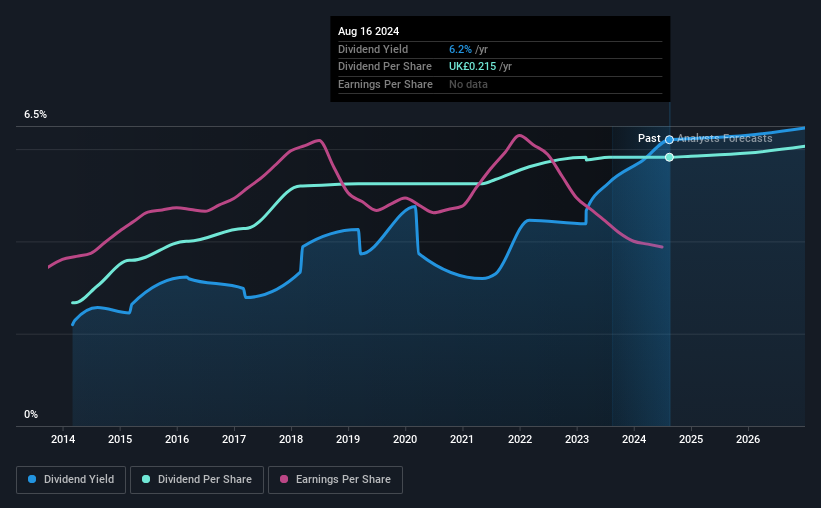- United Kingdom
- /
- Capital Markets
- /
- LSE:SDR
We Wouldn't Be Too Quick To Buy Schroders plc (LON:SDR) Before It Goes Ex-Dividend

Schroders plc (LON:SDR) stock is about to trade ex-dividend in 4 days. Typically, the ex-dividend date is one business day before the record date which is the date on which a company determines the shareholders eligible to receive a dividend. The ex-dividend date is an important date to be aware of as any purchase of the stock made on or after this date might mean a late settlement that doesn't show on the record date. This means that investors who purchase Schroders' shares on or after the 22nd of August will not receive the dividend, which will be paid on the 26th of September.
The company's next dividend payment will be UK£0.065 per share, on the back of last year when the company paid a total of UK£0.21 to shareholders. Based on the last year's worth of payments, Schroders has a trailing yield of 6.2% on the current stock price of UK£3.466. If you buy this business for its dividend, you should have an idea of whether Schroders's dividend is reliable and sustainable. We need to see whether the dividend is covered by earnings and if it's growing.
See our latest analysis for Schroders
If a company pays out more in dividends than it earned, then the dividend might become unsustainable - hardly an ideal situation. Last year, Schroders paid out 90% of its income as dividends, which is above a level that we're comfortable with, especially if the company needs to reinvest in its business.
When a company pays out a dividend that is not well covered by profits, the dividend is generally seen as more vulnerable to being cut.
Click here to see the company's payout ratio, plus analyst estimates of its future dividends.

Have Earnings And Dividends Been Growing?
When earnings decline, dividend companies become much harder to analyse and own safely. If business enters a downturn and the dividend is cut, the company could see its value fall precipitously. With that in mind, we're discomforted by Schroders's 5.1% per annum decline in earnings in the past five years. Such a sharp decline casts doubt on the future sustainability of the dividend.
Another key way to measure a company's dividend prospects is by measuring its historical rate of dividend growth. In the last 10 years, Schroders has lifted its dividend by approximately 8.1% a year on average. The only way to pay higher dividends when earnings are shrinking is either to pay out a larger percentage of profits, spend cash from the balance sheet, or borrow the money. Schroders is already paying out a high percentage of its income, so without earnings growth, we're doubtful of whether this dividend will grow much in the future.
The Bottom Line
Should investors buy Schroders for the upcoming dividend? Earnings per share are in decline and Schroders is paying out what we feel is an uncomfortably high percentage of its profit as dividends. It's not that we hate the business, but we feel that these characeristics are not desirable for investors seeking a reliable dividend stock to own for the long term. Schroders doesn't appear to have a lot going for it, and we're not inclined to take a risk on owning it for the dividend.
With that being said, if you're still considering Schroders as an investment, you'll find it beneficial to know what risks this stock is facing. Every company has risks, and we've spotted 2 warning signs for Schroders you should know about.
Generally, we wouldn't recommend just buying the first dividend stock you see. Here's a curated list of interesting stocks that are strong dividend payers.
New: Manage All Your Stock Portfolios in One Place
We've created the ultimate portfolio companion for stock investors, and it's free.
• Connect an unlimited number of Portfolios and see your total in one currency
• Be alerted to new Warning Signs or Risks via email or mobile
• Track the Fair Value of your stocks
Have feedback on this article? Concerned about the content? Get in touch with us directly. Alternatively, email editorial-team (at) simplywallst.com.
This article by Simply Wall St is general in nature. We provide commentary based on historical data and analyst forecasts only using an unbiased methodology and our articles are not intended to be financial advice. It does not constitute a recommendation to buy or sell any stock, and does not take account of your objectives, or your financial situation. We aim to bring you long-term focused analysis driven by fundamental data. Note that our analysis may not factor in the latest price-sensitive company announcements or qualitative material. Simply Wall St has no position in any stocks mentioned.
About LSE:SDR
6 star dividend payer with adequate balance sheet.
Similar Companies
Market Insights
Community Narratives



